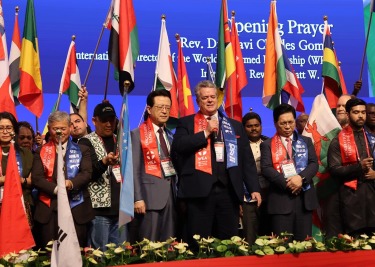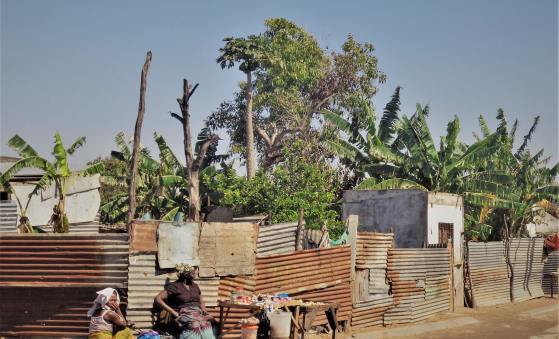
The World Evangelical Alliance opened its 14th General Assembly at Sarang Church on Monday, bringing together approximately 900 international delegates from 124 countries for what organisers describe as a pivotal moment in global Christianity.
The four-day gathering, which runs till 31 October, centres on the theme “The Gospel for Everyone by 2033”, marking the 2,000th anniversary of Christ’s resurrection. The assembly unites representatives from nine regional and 161 national alliances, collectively representing over 600 million evangelicals worldwide.
Executive Chair Goodwill Shana opened the proceedings, emphasising the assembly’s deeper purpose. “Unity requires more than formal membership; it demands authentic partnership centred on the Gospel,” Shana said. “As the General Assembly celebrates the realities of a shifting evangelical landscape, we aim to further inspire delegates to go and share the transformative Gospel across geographical, cultural and digital boundaries.” Flag bearers from represented nations formed a colourful mosaic during the opening ceremony.
The event marks significant growth for the 179-year-old organisation. Since the last assembly in Indonesia in 2019, the WEA has added 27 new National Evangelical Alliances, particularly strengthening representation from Africa, Asia and Central Asia, including nations such as Mauritania, Kazakhstan, Burundi and Uzbekistan. The organisation now represents 161 nations, with 70 per cent of the world’s evangelicals residing in Africa, Asia and Latin America.
A panel discussion on Monday morning highlighted Africa’s pivotal role in this demographic shift. Jason Mandryk, editor of Operation World, told delegates that evangelicals now constitute over 25 per cent of all Christians globally, up from just 8 per cent in 1960. He noted that nearly 70 per cent of all Christian growth worldwide is occurring in Africa alone, where rapid urbanisation has accompanied the movement of rural Christians to cities.
Mandryk described 1980 as a turning point when global Christianity shifted decisively away from the West, adding that the notion of Christianity as the white man’s religion is rapidly disappearing. However, he acknowledged credibility challenges facing the movement, noting that evangelicals have failed to live up to the gospel they preach, with their testimony marred by scandal and hypocrisy.
Dr Wanjiru Gitau, Assistant Professor of Practical Theology and World Christianity at Palm Beach Atlantic University, described sweeping demographic changes across Africa. She noted that over 50 per cent of the continent’s population is under 20, and identified rapid population increase, a rising educated middle class, and citizens connected globally through technology as defining features. She emphasised that Africa is no longer socially or culturally left behind but is a continent on the move, rich with untapped human and natural potential.
She highlighted that pastors and Christian marketplace leaders are amongst the most trusted figures in African societies, often filling gaps left by political instability and providing stability and hope where civic leadership fails. Her priorities included engaging existing churches rather than starting new ones and investing in high-quality education imbued with Christian hope.
However, this expansion has created urgent challenges. Dr David Tarus, Executive Director of the Association for Christian Theological Education in Africa, presented research showing that 90 per cent of African pastors lack formal theological training, whilst 79.5 per cent do not have a bachelor’s degree or equivalent. Financial constraints affect nearly 88 per cent of those surveyed.
He warned that without strong foundations in Scripture and sound theology, the church’s growth could be undermined by shallow teaching or false doctrines. Tarus urged the church to develop flexible, local training models, noting that the four-year residential model cannot meet the scale of need. He cited his own father, who planted many churches despite never having formal theological education, receiving instead informal training from Christians who taught in villages.
Seoul’s selection as host city reflects South Korea’s transformation from mission field to missionary force over the past 140 years. The country now ranks among the world’s largest missionary-sending nations, dispatching close to 22,000 commissioned missionaries globally, according to the Korean Research Institute for Mission.
Attorney Botrus Mansour, who will assume leadership as the WEA’s first Middle Eastern Secretary General at the assembly’s close, delivered his first address to the global constituency. Reflecting on Psalm 133 and John 17, he emphasised the biblical call to unity. “Jesus prayed, ‘Let them be one as we are one,’” Mansour said. “Just imagine the closeness of that unity, like the Father, Son and Holy Spirit. That is the kind of bond we are called to live out.”
Pastor Rick Warren addressed delegates on accomplishing the 2033 vision, outlining five key activities that defined Jesus’ earthly ministry, summarised by the acronym PEACE: Pass on the Good News, Equip Disciples, Alleviate Suffering, Continually Pray and Establish New Churches. Warren urged leaders to follow not just Christ’s message but His methods, emphasising that truly biblical principles are transcultural and will work anywhere.
The assembly also featured insights on digital evangelism from Lord Robert Edmiston and Lady Tracie Edmiston of Christian Vision, whose ministry has adapted from shortwave radio to social media platforms. Lord Edmiston explained that their online campaigns have reached over 1.5 billion people, with engagement dramatically increasing during COVID when they began reaching more than a million people daily.
The gathering includes Members Meetings on 29 and 30 October, where national alliance leaders will discuss and vote on united initiatives. The assembly will also elect a new International Council, the WEA’s governance board, and features an art exhibition by internationally renowned artist Akaine.
Dr J N Manokaran, a Christian leader from India, speaking to Christian Today, praised the worldwide representation and spirit of unity among delegates. “People from different countries are having conversations, learning, edifying one another,” he said. However, he noted that the assembly could better address contemporary challenges. “The world is facing new realities like Gaza, Ukraine, and the negative impacts of AI on the Church. WEA should help the Church look beyond what has happened and foresee what’s coming,” Manokaran said.
Godfrey Yogarajah, chair of the Asia Evangelical Alliance, welcomed delegates and said Asia was privileged to host the General Assembly given its rich heritage and evangelical growth.
Samuel, a delegate from Sri Lanka, told Christian Today that the assembly offered more than celebration. “It wasn’t a gathering of just celebrating what the Church did positively, it had voices of constructive criticism too for the church to fill the gaps in reaching the world with His love,” he said.




